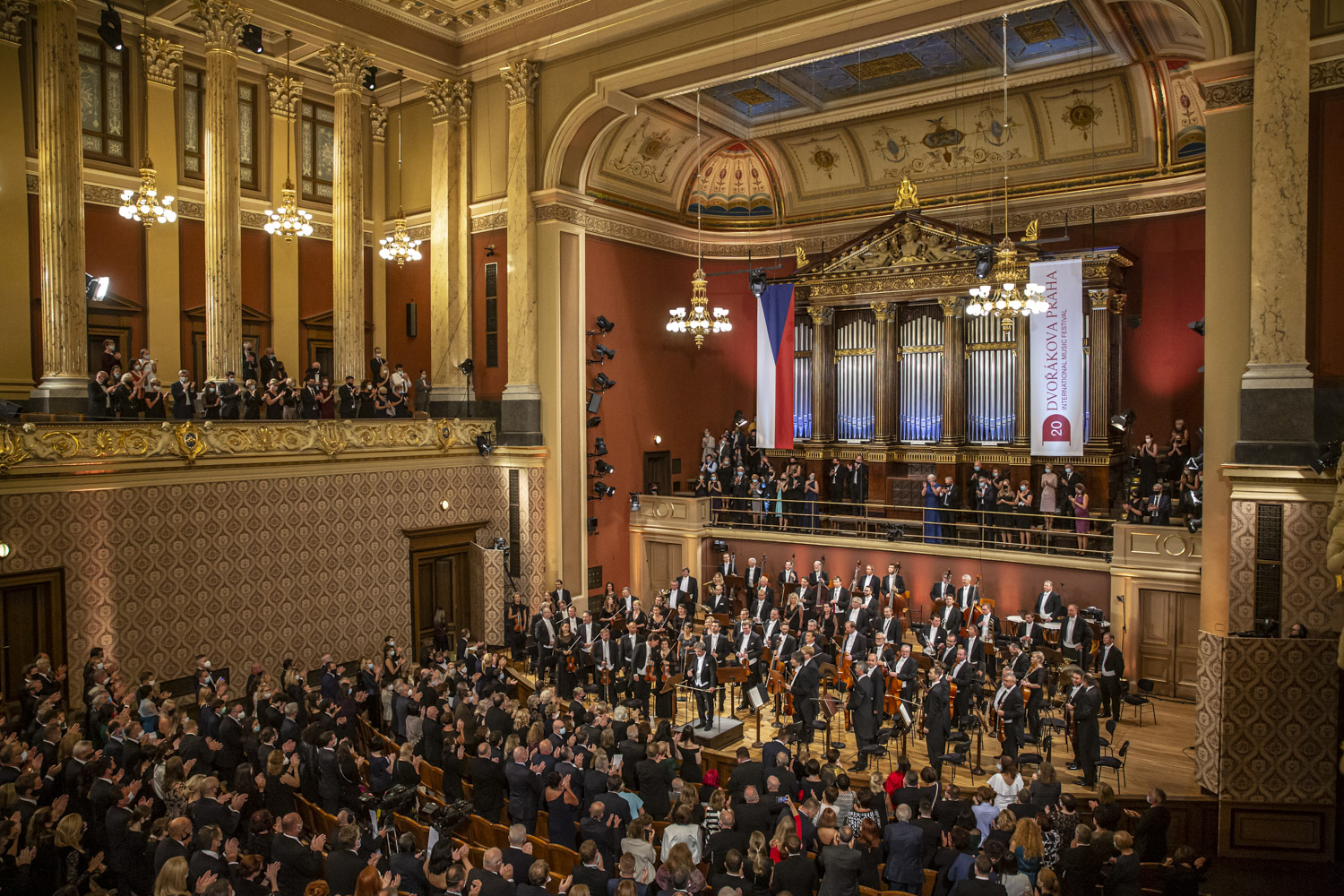
Antonín Dvořák: Love Songs, op. 83, B. 160 (arr. Jiří Teml)
Antonín Dvořák: Czech Suite, op. 39, B. 93
Sergei Rachmaninoff: Piano Concerto No. 2 in C minor, op. 18
You can watch a recording of our concluding concert on our YouTube channel HERE.
With this concert, we brought to a successful conclusion our 13th-annual festival, which took place almost in its entirety in spite of all of the difficulties caused by the coronavirus pandemic. Although there was a change to the programme caused by the illness of some members of the Prague Philharmonic Choir, the concert left an unforgettable impression on the audience members in attendance. With Antonín Dvořák’s tender Love Songs orchestrated by Jiří Teml and sung with heartfelt emotion by Kateřina Kněžíková, the chamber music-like intimacy Dvořák’s Czech Suite, and the ecstatically symphonic approach to the performance of Rachmaninoff’s 2nd Piano Concerto with the one and only Lukáš Vondráček at the piano, the public experienced a lovely evening.
We wish to thank the Czech Philharmonic and the evening’s soloists for enabling us to share this experience. We believe that the audience’s explosion of enthusiasm at the conclusion is an expression of the hope that a year from now, we will meet again at the festival under better conditions than those that accompanied this year’s festival.
Gramophone’s 2024 ‘Orchestra of the Year’, the Czech Philharmonic gave its first concert – an all-Dvořák programme conducted by the composer himself – in the famed Rudolfinum Hall on 4 January 1896. The Orchestra is acknowledged for its definitive interpretations of Czech composers and recognised for its special relationship with the music of Brahms, Tchaikovsky, and Mahler, who conducted the world première of his Symphony No. 7 with the Orchestra in 1908. It is currently recording the complete cycle of Mahler symphonies with Chief Conductor and Music Director Semyon Bychkov for Pentatone.
The Czech Philharmonic’s extraordinary and proud history reflects both its location at the very heart of Europe and the Czech Republic’s turbulent political history, for which Smetana’s Má vlast has become a potent symbol. 2024 was the Year of Czech Music, a major celebration launched on the bicentenary of Smetana’s birth and held across the Czech Republic every ten years. The Czech Philharmonic marked Smetana’s bicentenary with a series of concerts at the Smetana Litomyšl Festival, including a rare concert performance of his opera Libuše, conducted by Principal Guest Conductor Jakub Hrůša.
The contribution of the Czech Philharmonic and Semyon Bychkov to the Year of Czech Music was the Dvořák Festival, a combined performance of three overtures, instrumental concerts, and the last three symphonies of Antonín Dvořák, both in Prague and on tour in South Korea, Japan, Spain, Austria, Germany, Belgium, and France. The highlight of the Year of Czech Music performed by Semyon Bychkov and the Czech Philharmonic was a series of three concerts in New York's Carnegie Hall.
Alongside the Czech Philharmonic’s Youth Orchestra, Orchestral Academy, and Jiří Bělohlávek Prize for young musicians, a comprehensive education strategy engages with more than 400 schools, bringing students of all ages to the Rudolfinum – some travelling as long as four hours – to hear concerts and participate in workshops. An inspirational music and song programme led by singer Ida Kelarová for the extensive Romani communities within the Czech Republic and Slovakia has helped many socially excluded families to find a voice.
An early champion of the music of Martinů and Janáček, the works of Czech composers – both established and new – remain the lifeblood of the Orchestra. Instigated by Semyon Bychkov at the start of his tenure, nine Czech composers and five international composers – Detlev Glanert, Julian Anderson, Thomas Larcher, Bryce Dessner, and Thierry Escaich – were commissioned to write for the Orchestra.
source: Česká filharmonie
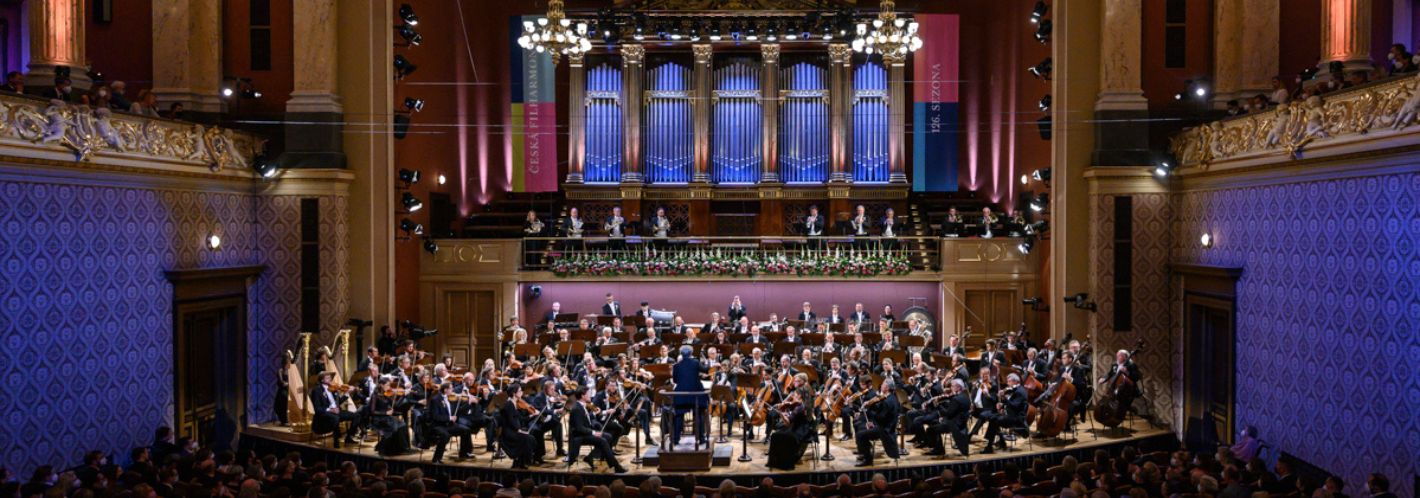
Petr Altrichter made his debut with the Czech Philharmonic in 1979, and has subsequently conducted the Orchestra on numerous occasions in Prague, on tour in China, Germany, in Japan and Taiwan.
He was raised in a musical family, and he played musical instruments from a young age. Having graduated from the conservatory in Ostrava as a French horn player and conductor, he continued his studies at the Janáček Academy of the Performing Arts in Brno in the fields of orchestral conducting under the guidance of Otakar Trhlík and František Jílek and choral conducting with the teachers Josef Veselka and Lubomír Mátl. After his studies in Brno, he worked as a choirmaster and conductor with the Brno Academic Choir, and he played a part in the earning of many prizes at foreign choral competitions and festivals (Middlesbrough, Debrecen…).
Altrichter attracted international attention in 1976, when he earned the title of laureate and a special prize from the jury at the renowned conducting competition in Besançon, France. On the basis of that prize, he became Václav Neumann’s assistant conductor with the Czech Philharmonic, and he started his own artistic career. Not long after that, he began to receive invitations to conduct orchestras abroad.
After a period of activity with the Brno Philharmonic, in 1988 he became a conductor of the Prague Symphony Orchestra, and in 1990 he became its principal conductor. With that orchestra, he made frequent foreign tours to Japan, the USA, Switzerland, Germany, France, and other countries. At the same time, he was engaged in long-term collaboration with the Czech Chamber Philharmonic Orchestra in Pardubice, with which he often gave performances abroad introducing many gifted young soloists (such as Isabelle van Keulen and Radek Baborák) who are now firmly established on concert stages around the world.
From 1993, he was the music director of the Southwest German Philharmonic Orchestra of Constance, with which he gave concerts regularly at the Tonhalle in Zurich and at the KKL in Lucerne, and he also toured Switzerland and Italy.
Petr Altrichter made his debut in the United Kingdom with the Prague Symphony Orchestra at the Edinburgh Festival in 1993, and his London debut with the English Chamber Orchestra followed soon thereafter. In 1997 he was appointed as the principal conductor of the Royal Liverpool Philharmonic after having guest conducted the orchestra with great success during the previous season. He also made an appearance with that orchestra in 2000 at the BBC Proms at London’s Royal Albert Hall, and he made a number of highly acclaimed recordings for the orchestra’s own label – RLPO Live.
In 2001 Altrichter was invited to take the helm of the Brno Philharmonic, and he remained there for seven years, returning to the orchestra with which he had been associated since his student days, and he still continues to guest conduct there regularly.
In 2015 he toured Germany with the Czech Philharmonic, and in late 2015 and early 2016, he toured China with the same orchestra. In the spring of 2017 he toured Japan with the Prague Symphony Orchestra, and his 2018 calendar included a tour of the United Kingdom with the Czech National Symphony Orchestra.
He has guest conducted major orchestras abroad, including Japan’s NHK Symphony Orchestra, Berlin Symphony Orchestra, Bruckner Orchestra in Linz, Warsaw Philharmonic, Krakow Philharmonic, Southwest German Radio Symphony Orchestra in Baden-Baden, Latvian National Symphony Orchestra in Riga, Gran Canaria Philharmonic Orchestra, Luxembourg Philharmonic Orchestra, Netherlands Philharmonic, Stavanger Symphony Orchestra, Norrköping Symphony Orchestra, Royal Danish Orchestra in Copenhagen, and Odense Symphony Orchestra. In the United Kingdom he has collaborated with the BBC Symphony Orchestra, the Royal Scottish National Orchestra, the BBC Scottish Symphony Orchestra, and the London Philharmonic Orchestra.
He has made guest appearances at major festivals in Salzburg, Edinburgh, Avignon, Athens, Cheltenham, Paris, Madrid, Chicago, Zurich, Lucerne, Vienne, Seville, Palermo, and elsewhere.
The bulk of Petr Altrichter’s repertoire consists of Czech music – Bedřich Smetana, Antonín Dvořák, Leoš Janáček, and Bohuslav Martinů, Russian music – especially Dmitri Shostakovich, and the works of Gustav Mahler and Anton Bruckner. Important soloists and performers from around the world (Garrick Ohlsson, John Lill, Tabea Zimmermann…) value his flexibility in leading orchestral accompaniments, and they seek out collaboration with him.
Source: Petr Altrichter

The indisputable winner of the Grand Prix at the 2016 International Queen Elisabeth Piano Competition, Lukáš Vondráček’s 2023/24 season highlights include a tour with Bamberg Symphony Orchestra and Jakub Hrůša in Boston, as well as returns to long term partners such as the Czech Philharmonic Orchestra, the West Australian Symphony Orchestra and the Janacek Philharmonic.
Following recent appearances at the Flanders Festival, the “Le Piano Symphonique” Festival, and the Weiwuying International Festival in Taiwan, recital engagements have taken him to the ”Chopin and his Europe” Festival in Warsaw and the Piano Loop Festival in Split.
Over the last decade, Lukáš Vondráček has travelled the world working with various orchestras such as the Philadelphia and Sydney Symphony orchestras, the Tokyo Metropolitan Symphony Orchestra, the Dresden Philharmonic Orchestra, the Frankfurt Radio Symphony Orchestra, the Philharmonia Orchestra, the Oslo Philharmonic and the Netherlands Philharmonic orchestras under conductors such as Paavo Järvi, Gianandrea Noseda, Jakub Hrůša, Yannick Nézet-Séguin, Marin Alsop, Christoph Eschenbach, Pietari Inkinen, Vasily Petrenko, Anu Tali, and Stéphane Denève, among many others.
Recitals have led him to Hamburg’s Elbphilharmonie, the Flagey in Brussels, Leipzig’s Gewandhaus, Wiener Konzerthaus, the Concertgebouw in Amsterdam, and to renowned festivals such as Menuhin Festival Gstaad, PianoEspoo in Finland, Prague Spring Festival, and Lille Piano Festival.
At the age of four, Lukáš Vondráček made his first public appearance. As a fifteen-year-old in 2002, he made his debut with the Czech Philharmonic Orchestra and Vladimir Ashkenazy, which was followed by a major US tour in 2003. His natural and assured musicality and remarkable technique have long marked him out as a gifted and mature musician. He has achieved worldwide recognition by receiving many international awards, foremost first prizes at the Hilton Head and San Marino International Piano Competitions and Unisa International Piano Competition in Pretoria, South Africa, as well as the Raymond E. Buck Jury Discretionary Award at the 2009 International Van Cliburn Piano Competition.
After finishing his studies at the Academy of Music in Katowice and the Vienna Conservatoire, Lukáš Vondráček obtained an Artist Diploma from Boston's New England Conservatory under the tutelage of Hung-Kuan Chen, graduating with honours in 2012.
source: Harrison Parott
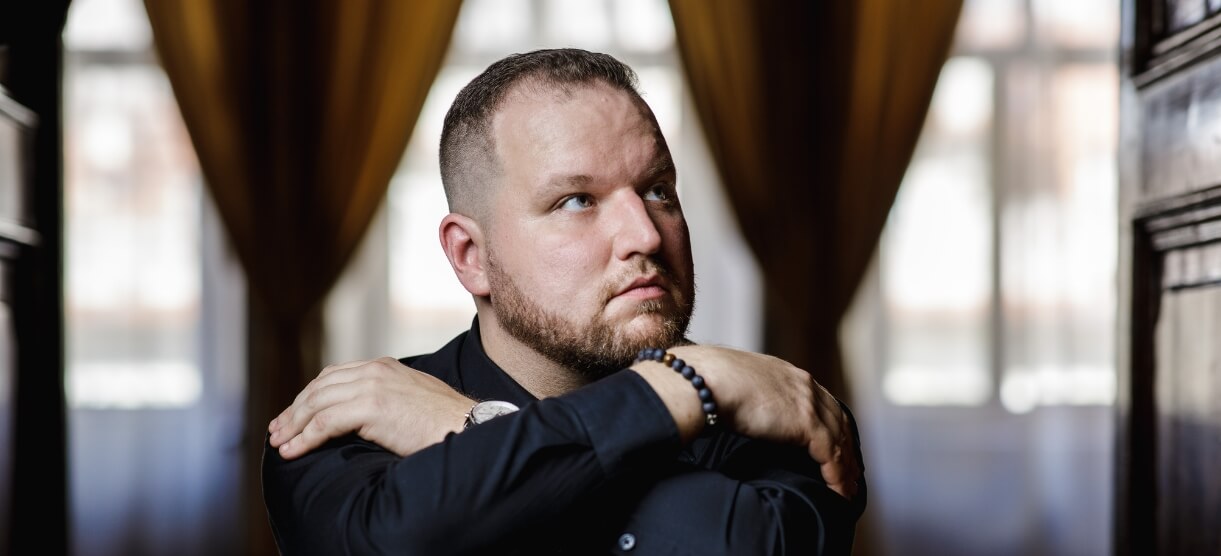
Kateřina Kněžíková is one of the most promising sopranos of her generation. In addition to her opera career, she increasingly focuses on concert repertoire, achieving success both in her native Czech Republic and abroad. Her core repertoire includes works by Antonín Dvořák, Bohuslav Martinů, Leoš Janáček, as well as the art song genre. She is the recipient of the Classic Prague Awards 2018 for Best Chamber Performance and the Thalia Award 2019 for her outstanding stage portrayal in Julietta or The Key to Dreams (B. Martinů) at the National Moravian-Silesian Theatre.
A graduate of the Prague Conservatory and the Academy of Performing Arts in Prague, Kněžíková has been a permanent member of the National Theatre Opera since 2006. Her current roles there include appearances in Rusalka, Così fan tutte, Carmen, Jenůfa, The Bartered Bride, and The Cunning Little Vixen.
She has performed at numerous festivals, including the Glyndebourne Opera Festival, Prague Spring International Music Festival, Dvořák Prague International Music Festival, and Smetana’s Litomyšl. Her collaborations with leading orchestras include the BBC Symphony Orchestra, Bamberg Symphony, Camerata Salzburg, Czech Philharmonic, Deutsches Symphonie-Orchester Berlin, London Philharmonic Orchestra, Mahler Chamber Orchestra, National Polish Radio Symphony Orchestra, ORF Vienna Radio Symphony Orchestra, Rotterdam Philharmonic Orchestra, Royal Liverpool Philharmonic Orchestra, Orchestre Philharmonique de Radio France, Orchestra dell’Accademia Nazionale di Santa Cecilia, Prague Radio Symphony Orchestra, Tokyo Symphony Orchestra, among others.
She has worked under the baton of many distinguished conductors, including Jiří Bělohlávek, Semyon Bychkov, Serge Baudo, Plácido Domingo, Asher Fisch, Manfred Honeck, Domingo Hindoyan, Jakub Hrůša, Oksana Lyniv, Tomáš Netopil, John Nelson, Petr Popelka, and Robin Ticciati.
In 2021, Kněžíková released her debut solo album “Phidylé” with Supraphon, which was named Editor’s Choice and listed among Gramophone's Best Classical Albums of 2021, also winning the BBC Music Magazine Award in the Vocal category. Her discography with Radioservis includes the albums “Fantasie” and “K2”. In September 2024, she released “Tag und Nacht” with Jakub Hrůša and the Bamberg Symphony under the Supraphon label.
In December 2024, she made a highly successful debut with the Czech Philharmonic at Carnegie Hall, conducted by Semyon Bychkov.
source: Agentura Camerata
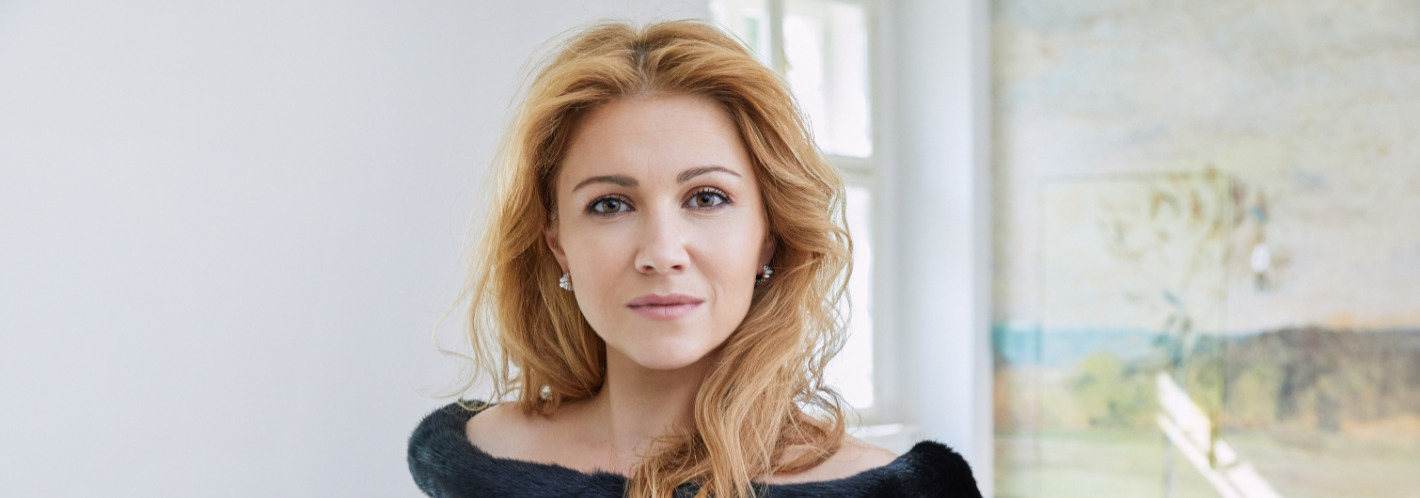
The Czech baritone Svatopluk Sem is a graduate of the České Budějovice Conservatoire. He is a regular guest on the most important Czech opera stages including the National Theatre in Prague, the J. K. Tyl Theatre in Pilsen, the National Theatre in Brno, and the National Moravian – Silesian Theatre in Ostrava. He also devotes himself to the concert repertoire, appearing not only in the Czech Republic, but also on many concert stages abroad (Japan, Denmark, South Korea, Austria, Spain, Germany, Russia, England), where he has collaborated with renowned conductors including Jiří Bělohlávek, Heiko Mathias Förster, and Tomáš Netopil. He took part in recording Smetana’s opera The Bartered Bride with the BBC Symphony Orchestra under the baton of Jiří Bělohlávek for the Harmonia Mundi label, and he performed in the BBC documentary Rolando meets Don Giovanni, where he appeared together with Rolando Villazón in the title role of Don Giovanni. He is a frequent guest at such prestigious festivals as the BBC Proms, the Dvořák Prague Festival, the Open-Air Gars am Kamp Festival in Austria, the Prague Spring Festival, and Smetana’s Litomyšl.
The Prague Philharmonic Choir (PPC) was founded in 1935 by choirmaster and teacher Jan Kühn. Now in its 91st season, it is the oldest professional choir in the Czech Republic. The choir is celebrated beyond Czech borders, especially for its interpretations of oratorios and cantatas. Lukáš Vasilek has served as Principal Conductor and Artistic Director since 2007, joined by Lukáš Kozubík as the choir’s Second Choirmaster.
Under Lukáš Vasilek’s leadership, the Prague Philharmonic Choir has established a reputation as a highly esteemed performing partner of leading international orchestras. At home, the ensemble collaborates regularly with the Czech Philharmonic and, for its own choral concerts, with the Prague Philharmonia. Internationally, the PPC has worked with ensembles such as the Berlin and Dresden Philharmonic Orchestras, Wiener Symphoniker, NDR Elbphilharmonie Orchestra, and the Hong Kong Philharmonic Orchestra.
The PPC has also gained extensive experience working with the world’s top conductors, including Semyon Bychkov, Jakub Hrůša, and Sir Simon Rattle. The choir regularly appears at the Czech Republic’s most renowned festivals, such as Smetana’s Litomyšl, Prague Spring, Dvořák Prague, and Days of Bohuslav Martinů. Since 2010, the PPC has served as Choir in Residence at the Bregenzer Festspiele.
In its 91st season, the Prague Philharmonic Choir will embark on further exciting collaborations with world-renowned conductors, including Zubin Mehta, Antonio Pappano, and Giovanni Antonini.
Alongside its performances, the PPC engages in numerous educational projects. Every season, it presents a cycle of educational concerts for children, catering to both school groups and families. These programs emphasize fun and active engagement with young listeners. The PPC Choral Academy in Honour of Soňa Červená offers singing students the opportunity to gain hands-on experience in a professional ensemble, participate in large-scale musical projects, and learn from collaborations with leading artists.
The choir’s artistic excellence is further demonstrated through its rich recording archive, which continues to expand each season. The PPC has appeared on releases from PENTATONE, Decca Classics, Sony Classical, and Supraphon. Its recordings have earned numerous international accolades, including awards from Gramophone, BBC Music Magazine, and the prestigious Diapason d’Or de l’Année. The PPC’s very first recording, made in 1952, featured Dvořák’s oratorio Stabat Mater conducted by Václav Talich. Its most recent release, Stravinsky, Janáček, Bartók: Village Stories, explores the magic of folk songs and traditional rituals in the music of three 20th-century masters.
The Prague Philharmonic Choir is a laureate of the 2018 Classic Prague Award for Best Vocal Concert, Czech Television’s Classical Music of the Year Award, and the 2022 Antonín Dvořák Prize for exceptional artistic achievements and the promotion of Czech music. The album Village Stories received the Choc de Classica award in May 2024.
source: Pražský filharmonický sbor
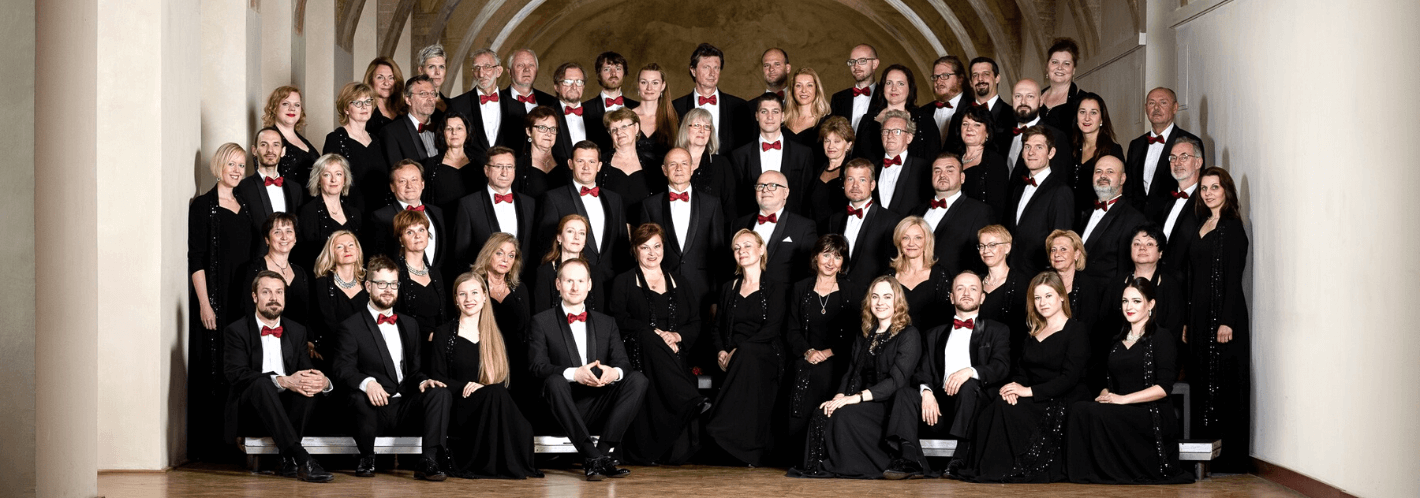
Lukáš Kozubík is the choirmaster of the Prague Philharmonic Choir and chief choirmaster of the National Theatre Choir in Prague. As a guest artist, he has collaborated with leading orchestras in several Czech and Slovak opera houses.
With the Prague Philharmonic Choir, he has performed works by Antonín Dvořák, Francis Poulenc, Alexander Scriabin, and Richard Wagner. Smetana’s Litomyšl was captivated by his performance of Carmina Burana, and for the Swiss St. Galler Festspiele, he and his choir prepared Schmidt’s opera Notre Dame. His warm and engaging style goes beyond classical concerts as he actively engages in educational projects and is working on developing a new series of family concerts.
He earned his choral conducting degree from the Janáček Academy of Performing Arts in Brno under the guidance of Lubomír Mátl. He also studied opera singing at the Janáček Conservatory and the Institute for Art Studies at the University of Ostrava. During his studies, he began to collaborate with a number of concert choirs, such as the Mátl Academic Choir, the Lumír Brno Choir, Musica Conspirata Brno, Ansámbl Forte, and Chorus Ostrava. Kozubík’s multifaceted artistic activities led him to the positions of assistant conductor, choirmaster, and accompanist at the JAMU Chamber Opera. He has served on the jury of several choral competitions. His extensive experience includes dozens of opera productions, which he has prepared not only for domestic stages, but also for festivals in Hungary, Poland, and Germany. He also performs cantata and oratorio works.
During his prolonged work period in Slovakia, he gravitated particularly towards opera. From 2012–2021, Lukáš Kozubík was the choirmaster of the State Theatre Opera in Košice. There, he also founded and artistically directed the SD Košice Children’s Opera Studio. As a teacher at the local conservatory, he founded an opera studio and a school choir. He regularly collaborated with the State Philharmonic Košice, the State Chamber Orchestra Žilina, and the Musica Iuvenalis Chamber String Orchestra.
source: Prague Philharmonic Choir

The Rudolfinum is one of the most important Neo-Renaissance edifices in the Czech Republic. In its conception as a multi-purpose cultural centre it was quite unique in Europe at the time of its construction. Based on a joint design by two outstanding Czech architects, Josef Zítek and Josef Schultz, a magnificent building was erected serving for concerts, as a gallery, and as a museum. The grand opening on 7 February 1885 was attended by Crown Prince Rudolph of Austria, in whose honour the structure was named. In 1896 the very first concert of the Czech Philharmonic Orchestra took place in the Rudolfinum's main concert hall, under the baton of the composer Antonín Dvořák whose name was later bestowed on the hall.
